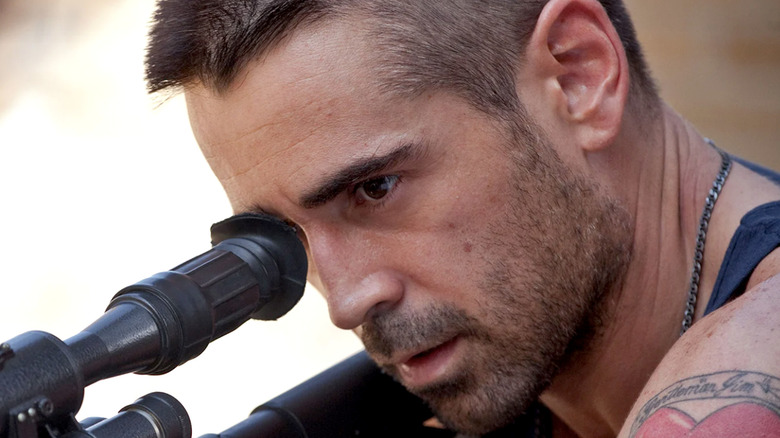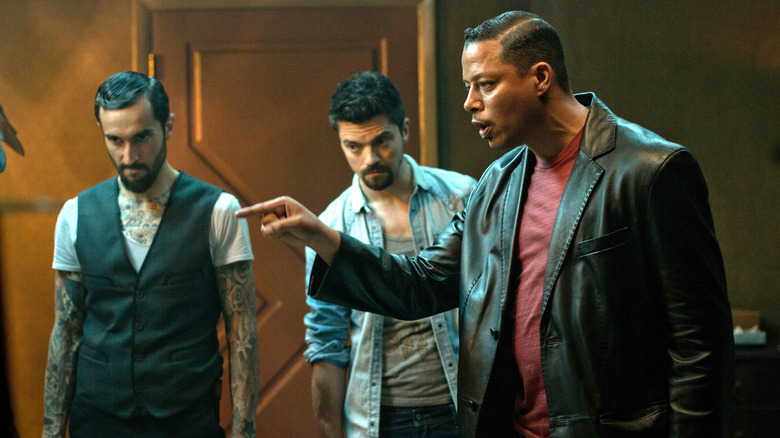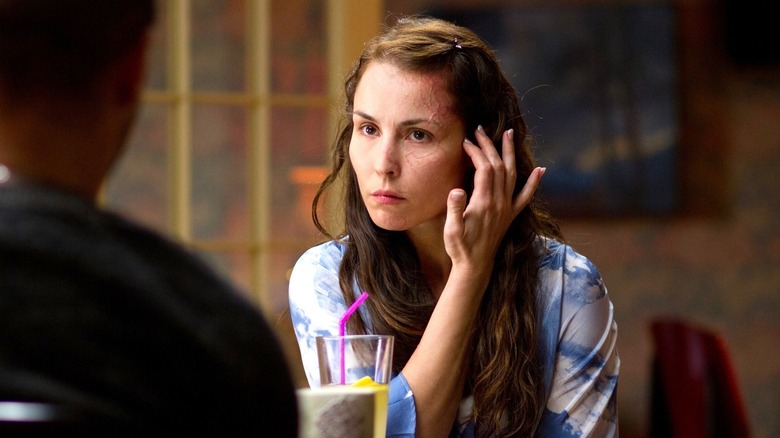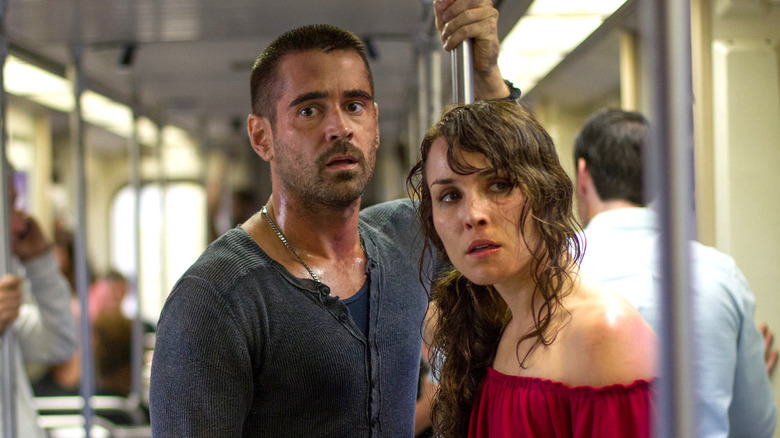The Ending Of Dead Man Down Explained
After filming the extremely successful Swedish-language "The Girl with the Dragon Tattoo" trilogy starring Noomi Rapace and the late Michael Nyqvist as Lisbeth Salander and Mikael Blomkvist, director Niels Arden Oplev took on a revenge thriller called "Dead Man Down" as his next project. Bringing Rapace along with him to play the character Beatrice, "Dead Man Down" also stars Colin Farrell as Victor, Dominic Cooper as Darcy, and Terrence Howard as crime kingpin Alphonse.
The story of "Dead Man Down" follows Farrell's character as he enacts an intricate plan to torture and kill Alphonse, as revenge for the crime boss killing Victor's wife and daughter a few years earlier. In the middle of his big plan, Victor meets Beatrice, a woman who lives in the apartment across from his balcony. After she sees him kill someone through the window and films it, she blackmails Victor. Beatrice wants Victor to kill the drunk driver who caused the scarring on her face, as he never faced consequences for his actions.
Over the course of the film, Victor continues his rampage while also growing closer to Beatrice, but soon Alphonse starts to catch on to his plans. Do Victor and Beatrice finally get their revenge? Here's the ending of "Dead Man Down" — explained.
Victor sets the trap for his final act of revenge
In order to truly get back at Alphonse for what he did two years earlier, Victor changes his name and infiltrates the man's criminal empire. He then starts anonymously threatening the man's life, even carrying out a fake assassination attempt to torture Alphonse. Eventually, Victor starts setting up a final trap to bring all the people involved with his family's death to one place, in order to take them all out at once. This includes another powerful figure in the world of crime named Ilir (James Biberi), so Victor kidnaps and kills Ilir's brother and frames Alphonse for it, or at least he tries.
While all this is happening, Beatrice and Victor get closer and start to care for one another, with Beatrice even helping Victor with his violent plans. One of her tasks is to mail a video to Ilir of his brother saying that Alphonse is behind his murder. This would lead Ilir to go after Alphonse, bringing them to one location for Victor's final act. But Beatrice doesn't do it, caring too much for Victor to allow him to walk into what she believes is certain death. Unfortunately, Alphonse now knows that Victor is behind everything, so he kidnaps Beatrice and sends Victor a message to come to his house.
Luckily for Victor, Ilir is also at Alphonse's place, so he loads up with weapons and drives into Alphonse's house — literally. A huge shootout happens, during which Beatrice is able to escape and play the memory card. Ilir and Alphonse finally see the video and turn their guns on each other, with both men dying, while Victor and Beatrice miraculously survive. With the revenge mission complete, the couple goes home, ending the film with a final kiss.
The movie is influenced by noir films and '90s thrillers
While "Dead Man Down" strongly emulates the vigilante thriller style of movies like "Taken," which have gotten really popular in the last decade or so, the movie is also visibly influenced by film noir and '90s thrillers. Early on in "Dead Man Down," there's an obvious reference to the Alfred Hitchcock movie "Rear Window" in how Victor and Beatrice meet. Peeking across the way into Victor's windows, Beatrice sees him murder someone and decides to film it, later using the video to manipulate him. So romantic, right?
The way that Beatrice watches the murder through the windows is very reminiscent of the classic Hitchcock movie starring James Stewart as Jeff, a man bedridden in his apartment who finds entertainment in watching the neighbors from his window. After a while, Jeff starts to think that the man across the way murdered his wife, but no one believes him.
Along with that, "Dead Man Down" shares a lot of story elements with the 1993 film "True Romance" about a couple running from the mob in Los Angeles, as well as similar '90s hit crime dramas like "Natural Born Killers" and "Thelma & Louise," comparisons mentioned by Rapace in an interview with The Playlist. Of course, Oplev also brings the gritty, dark style of filmmaking he used for "The Girl with the Dragon Tattoo" and the subsequent films to "Dead Man Down," which definitely adds to Victor's story of revenge.
Dead Man Down failed at the box office and with critics
Unfortunately for Oplev, Rapace, Farrell, and the rest of the team behind "Dead Man Down," the film did not do well when it was released. With a budget of around $30 million, the movie only made $18 million worldwide from its theatrical run, with $7 million more from DVD and Blu-ray sales, not even breaking even (The Numbers). To top it all off, most critics had a negative response to "Dead Man Down." Peter Debruge of Variety points out the film's many plot holes and overly complicated storylines, saying that "the pic isn't clever enough to smooth over such a contrived setup, and simply ignores the countless questions Victor's plan would raise." Even worse, "Dead Man Down" doesn't spend enough time establishing the protagonist's tragic backstory — the loss of his wife and daughter — to make the audience care about his grand scheme for revenge.
The movie does moderately well with the gritty, intense action, and there's an all-star cast to carry the film, but even that's not enough. At the heart of "Dead Man Down" is the relationship between Victor and Beatrice, but that's bogged down by conflicting messages about revenge and violence. While Victor is able to get his vengeance on Alphonse, satisfied and ready to move on once he does, he decides that he won't kill the man who scarred Beatrice because of the emotional impact it might have on her. It's a bit of a double standard, and overall "Dead Man Down" seems unclear about what it's trying to say.



